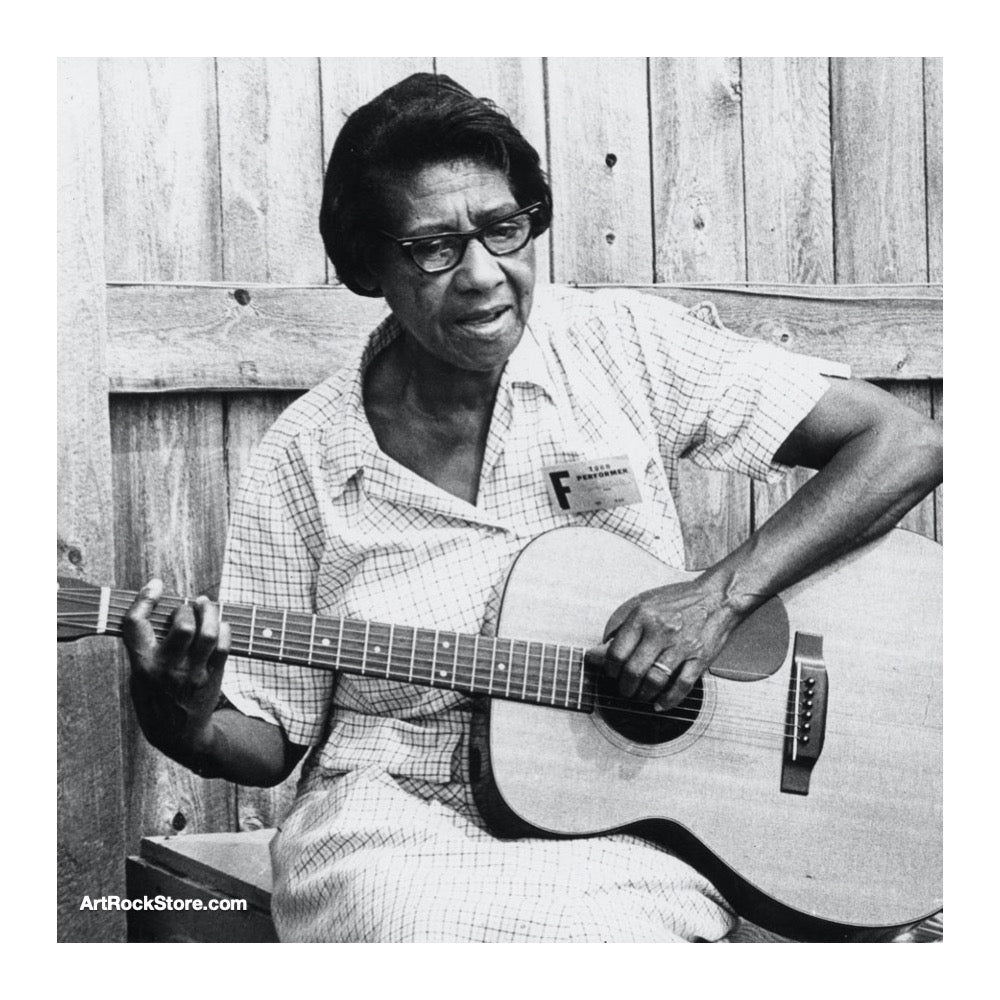
Elizabeth Cotten | Artist
Elizabeth "Libba" Cotten was an American folk and blues musician born 1893 in Carrboro, North Carolina. She was among the most influential guitarists to surface during the roots music revival era, her wonderfully expressive and dexterous fingerpicking style a major inspiration to the generations of players who followed in her wake. By the age of eight, Cotton was playing songs, and at age nine, she was forced to quit school and began work as a domestic worker. At the age of twelve, she had a live-in job at Chapel Hill. She earned a dollar a month, that her mother saved up to buy her first guitar. Although self-taught, she became proficient on the instrument, and her repertoire included a large number of rags and dance tunes. By her early teens, she was writing her own songs, one of which, "Freight Train", became one of her most recognized. The 1956 UK recording of the song by Chas McDevitt and Nancy Whiskey was a major hit and is credited as one of the main influences on the rise of skiffle in the UK. On November 7, 1910, at the age of 17, she married Frank Cotten. The couple had a daughter, Lillie, and soon after Elizabeth gave up guitar playing for family and church. Cotten retired from playing the guitar for 25 years, except for occasional church performances. She did not begin performing publicly and recording until she was in her 60s. She was discovered by the folk-singing Seeger family while she was working for them as a housekeeper. In the later half of the 1950s, Mike Seeger began making reel-to-reel recordings of Cotten's songs in her house. These recordings later became the album Folksongs and Instrumentals with Guitar, which was released by Folkways Records. Since the release of that album, her songs, especially her signature song, "Freight Train" have been covered by Peter, Paul, and Mary, Jerry Garcia, Bob Dylan, Joan Baez, Devendra Banhart, Laura Gibson, Laura Veirs, Tommy Emmanuel, His Name Is Alive, Doc Watson, Taj Mahal, and many others. In the early 1960s, Cotten went on to play concerts with some of the big names in the burgeoning folk revival, including Mississippi John Hurt, John Lee Hooker, and Muddy Waters at venues such as the Newport Folk Festival and the Smithsonian Festival of American Folklife. In her lifetime, three albums of Cotton's music were released: Folksongs and Instrumentals With Guitar (1958), Vol. 2: Shake Sugaree (1968), and Volume 3: When I'm Gone (1979). All three albums are recommended, as is the posthumous archival release Euphoria Blues (Live Portland '75) (2023). Cotton's self-taught guitar technique evolved from playing the banjo, where the uppermost string is not a bass string, but a short, high-pitched string which ends at the fifth fret. She was left-handed and played the guitar strung for a right-hander, but played it upside down. This position meant that she would play the bass lines with her fingers and the melody with her thumb. Her signature alternating bass style has become known as "Cotten picking", a style which reverberated through the generations, permeating many styles of music. Cotten died in June 1987, at Crouse-Irving Hospital in Syracuse, New York, at the age of 94.
Artist Website: wikipedia/Elizabeth_Cotten
Featured Albums: Elizabeth Cotten
Related Artists: Pete Seeger
